African violets bloom throughout the year and are a popular flowering plant kept indoors as well as outdoors. So, a common question that comes to any gardener’s mind is are African violets toxic?
African violets are non-toxic to humans and most pet animals, including cats, dogs. However, small children and pets might have an allergic reaction to the plant’s sap and foliage if they end up consuming the foliage out of curiosity. Thus, be cautious when they are around the plant.
This article will clear your doubts regarding the toxicity of African violets.
We will discuss how African violets are poisonous and the safety measures you can take to protect your kids and pets.
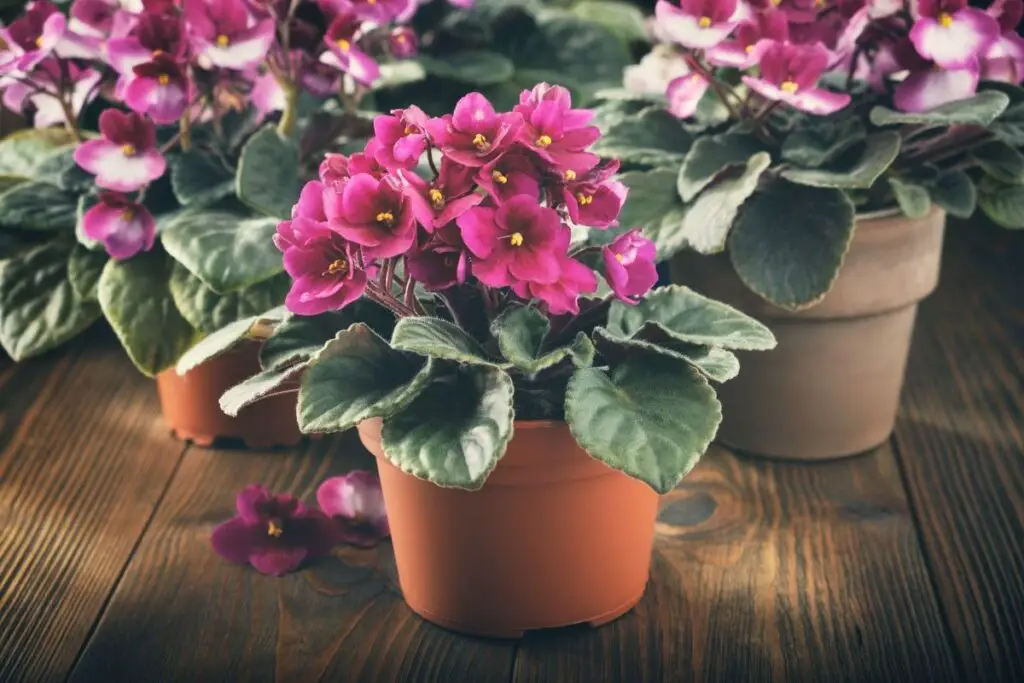
Are African violets edible?
African violets are not considered edible and can cause indigestion. An adult will not eat African violet, but children and pets can accidentally eat these plants out of curiosity.
These plants are not included in the regular diet, so they can affect the health of children and pets.
African violets are generally safe, but they can be harmful mainly due to the high content of saponins present in the roots and stems of the plants. Saponins are natural plant toxins found in African violets in great concentration.
This toxic substance can cause diarrhea, vomiting, cramping, and pain to pets and people sensitive to saponins.
African violets also contain salicylates in small quantities, so there is a risk of causing Reye syndrome if small children end up consuming it.
You should keep African violets away from the children and pets to protect them from the plant’s toxicity.
How poisonous are African violets?
African violets are not poisonous, but it has some toxicity. This potential toxicity can happen because of improper use of plants and higher consumption.
The composition of African violets includes substances like saponins, salicylates acid, which are slightly toxic.
African violets are not so toxic to humans and the majority of pets. These plants are not toxic if touched by humans, cats, dogs, and other pets.
African violets are mostly poisonous to rabbits and goats if eaten by them. African violets are not poisonous to kids or pets until and unless it is consumed in a higher amount.
Minor consumption of African violets does not harm your children or pets. But a large amount of consumption can cause sickness to them.
Try to maintain some safety measures to avoid this type of issue.
Are African violets poisonous to humans?
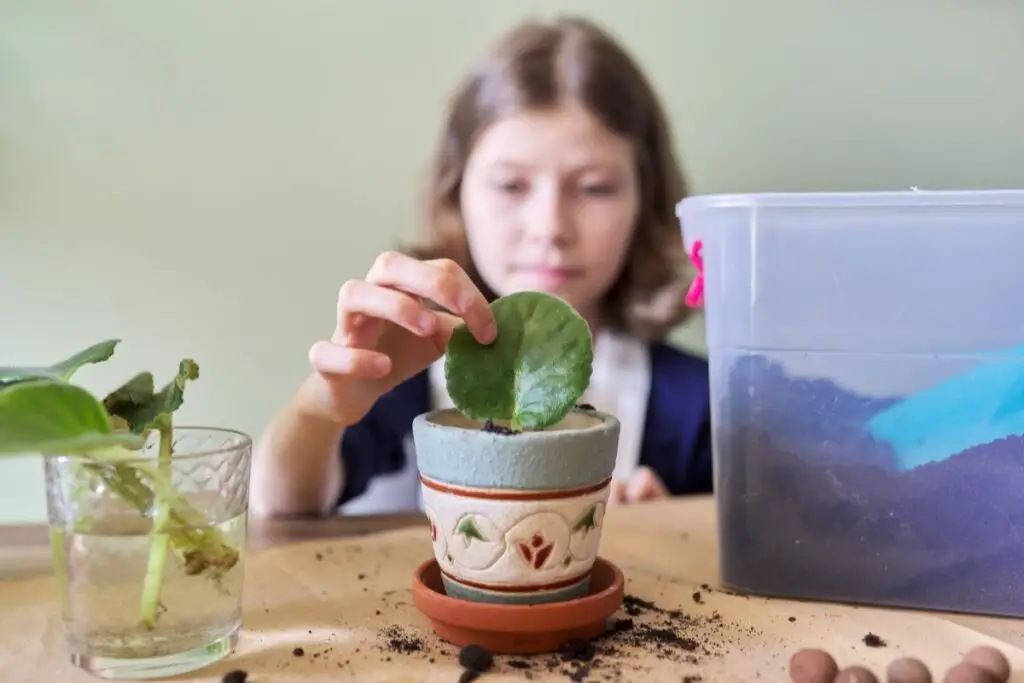
African violets are not poisonous to humans, and touching this plant will not harm them.
African violets remain non-toxic to humans unless the raiser makes these plants toxic by over-fertilizing and adding insecticides.
It can cause indigestion to humans only if it is consumed in a higher amount. Otherwise, African violets are safe for humans.
Looking for gardening supplies? We have tested 100's of products before recommending them to you guys. Check out our best pick below:
| Image | Gardening Supplies | Best Price? |
|---|---|---|
 Top
Top Top
Top | Raised Garden Bed Kit | Check On Amazon |
 | XLUX Soil Moisture Meter, Plant Water Monitor, Soil Hygrometer Sensor for Gardening, Farming, Indoor and Outdoor Plants, No Batteries Required | No Results |
 Top
Top Top
Top | 82 Pcs Garden Tools Set and Extra Succulent Tools Set | Check On Amazon |
 | Joeys Garden Expandable Garden Hose with 8 Function Hose Nozzle, Lightweight Anti-Kink Flexible Garden Hoses, Extra Strength Fabric with Double Latex Core, (50 FT, Black) | No Results |
 Top
Top Top
Top | Dual Chamber Compost Tumbler | Check On Amazon |
 Top
Top Top
Top | Sunnyglade Plant Stakes | Check On Amazon |
 Top
Top Top
Top | Organic Cold Pressed Neem Seed Oil | Check On Amazon |
 Top
Top Top
Top | Mighty Mint Gallon :-Insect and Pest Control Peppermint Oil | Check On Amazon |
 Top
Top Top
Top | Scotts DiseaseEx Lawn Fungicide | Check On Amazon |
 Top
Top Top
Top | Jacks Classic 20-20-20 All Purpose Fertilizer | Check On Amazon |
 Top
Top Top
Top | 30,000 Seeds Pollinator Attracting Wildflower Mixture | Check On Amazon |
 Top
Top Top
Top | Survival Vegetable Seeds Garden Kit-Over 16,000 Seeds | Check On Amazon |
Are African violets poisonous to pets?
African violets are a little poisonous and can cause health issues if your pets consume them in large amounts.
You may notice some symptoms in your pets, such as vomiting, stomach ache, diarrhea, or drooling if they have consumed African violets in a large amount.
This plant is not meant for consumption. So it can cause some adversity to your pet’s health.
Saponins in African violets can affect your pet’s digestive system, which can be the reason for your pet’s sickness.
The ideal way to keep your pets safe is to keep them away from African violets. The spot in your garden should be away from the reach of your pets.
Which pets are vulnerable to African violets poisoning?
African violets do not harm all kinds of pets, and some pets are vulnerable to African violet poisonings like rabbits, domestic animals, and sometimes dogs and cats.
Pets happily snuffle and touch up anything they come across. Sometimes, pets get too excited when they see any new plant and want to taste it badly. They are always curious to explore the different kinds of plants and flowers in your home.
Pets like rabbits and domestic animals like goats may face some health problems if they consume African violets. And pets like dogs and cats can also face problems due to high consumption.
There are various insects and bugs which are attracted to African violets. Such insects and bugs feed on them, and they secrete a clear sticky liquid called honeydew that makes African violets sticky.
If your pet consumes these plants, this sticky material can irritate your pet’s mouth and cause indigestion. You can take some precautions before your pet can get to the plant.
Are African violets toxic to cats?
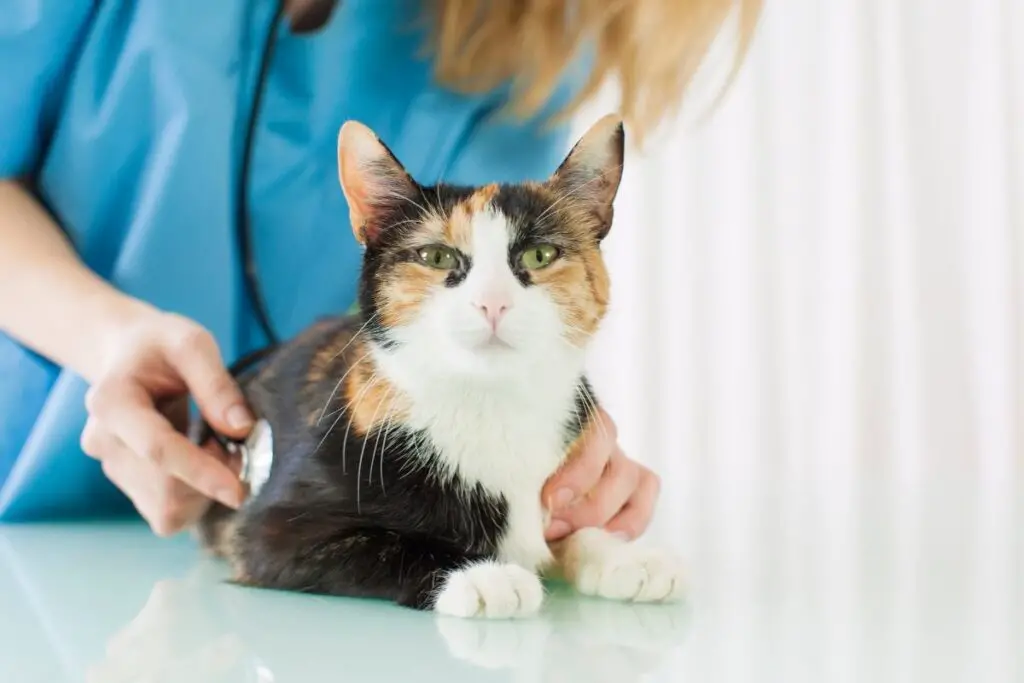
The beautiful colors of African violets may attract your cat. Sometimes, you can find your cats smelling and tasting the new plants in your house.
African violets are non-toxic to cats, and they will not cause any harm if the cats touch or smell this plant.
But African violets can be toxic to cats only if you have added some harmful products to your plant.
Such harmful products can be pesticides, sprays, and even systemic insecticides added to the soil and absorbed by the plant.
These fertilizers and insecticides can harm your cats and cause indigestion if they consume them through the plants.
You should always check the manufacturer’s labels for any toxicity information and warning. Your cats can show some mild symptoms by eating something unfamiliar to their digestive system.
If your cat consumes African violets in a considerable quantity, it may show specific symptoms. Such symptoms are:
- Loss of appetite
- Vomiting
- Drooling
- Diarrhea
- Lethargic behavior
- Sneezing
- Pawning at the mouth/nose
If your cat exhibits such behavior and symptoms, you must quickly take it to any animal clinic.
Methods to keep your cats away from African violets
- Spray or drop cat repellents near your African violets. The cat would not go there.
- Place aluminum foil around your African violets, cats hate the taste and sound of aluminum foil, and they also hate to feel and walk on it.
- You can use tea leaves by dropping them around your African violet leaves to keep your cats away.
- You can also isolate your plant in a room where you can close the door to prevent cats from nibbling on your African violets.
Are African violets poisonous to dogs?
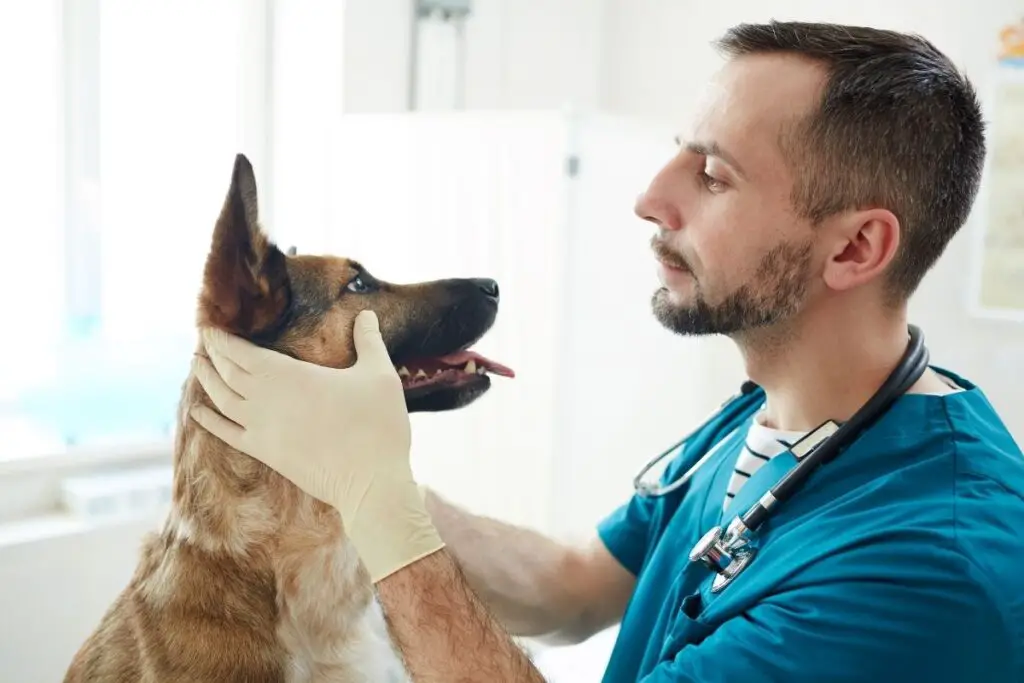
African violets are not very toxic to dogs, and any physical contact with African violets will not harm your dogs.
Dogs can be very notorious. If your dog ingests any unfamiliar material, it can cause diarrhea and allergic reactions.
If your African violets contain some harmful fertilizers and other additives in the soil, your dog can go ill.
African violates contains a natural compound such as saponins that can upset a dog’s digestive system.
Your dog will not face any severe illness if the consumption level is minor. But consuming in a large quantity can cause indigestion to them.
If your dog consumes African violets in large amounts, it can lead to symptoms like:
- Vomiting
- Diarrhea
- Excessive salivation
- Panting or lethargy
- Drooling
- Stomach ache
- Swelling
- Abdominal pain
If your dogs show any of the symptoms, contact your nearest animal clinic as soon as possible.
Methods to keep your dog away from African violets
- Keep your African violet in a place where your dog will not be able to reach.
- You can spray your plant with white vinegar or apple bitter to keep dogs away.
- Sprinkle red pepper flakes or powdered mustard around your African violets.
Are African violets poisonous to rabbits?
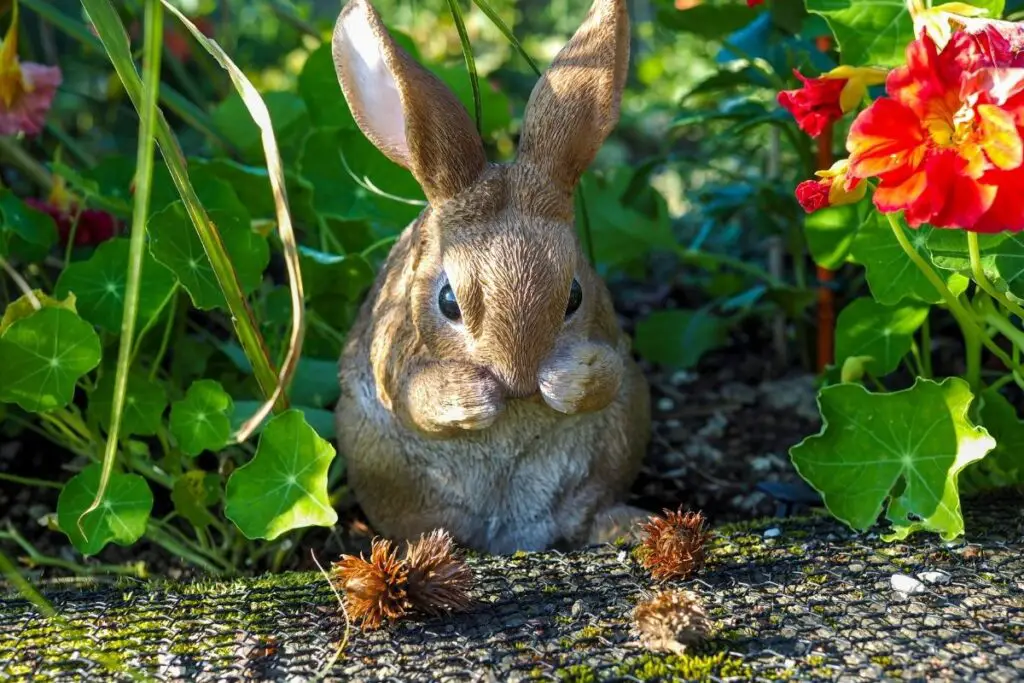
African violets can be poisonous to rabbits, and you should keep your rabbits away from this plant.
African violets have thick and fuzzy leaves that can cause abdominal discomfort and gassiness to rabbits.
Rabbits do not get ill immediately after consuming an unfamiliar material. They start to show some symptoms after a few days.
Such symptoms are:
- Abnormal behavior
- Becoming Aggressive
- Unusual postures
- Vomiting
- Diarrhea
- Loss of appetite
- Lethargy
How to keep rabbits away from African violets?
- Try to sprinkle dried sulfur around your African violets. This will keep them away.
- You can also put onions around your plants as rabbits dislike the smell of them.
- Spray the African violets with a mixture of 1 teaspoon Lysol and 1 gallon of water.
Are African violates poisonous to other small animals?
Small animals such as guinea pigs are susceptible to African violets as these plants are toxic for guinea pigs.
It can be risky for such small animals if they consume the African violets.
It can be harmful if they ingest even a little bit.
African violates are toxic for hamsters too, and it is risky for them as it can cause indigestion if consumed. You should keep such small animals away from this plant.
What to do if your pet ate African violets?
It should be the owner’s responsibility to take care of their pets’ needs and eating habits.
Pets don’t know which food is good for them and which food can harm them, and they accidentally eat such things which were not supposed to be eaten.
If you think your pet has consumed African violets, you must take some professional advice from the pet’s clinic. You must tell every symptom and problem that your pet is experiencing after having African violets.
You must make sure your pet is breathing correctly and behaving normally. If you find any strange change or behavior, you should immediately contact your nearest animal clinic.
A professional can tell whether you need to bring your pet to the clinic or you need to treat them in your home.
You should never take this situation casually. If you help your pet immediately, the chances of recovery will be better for your pet.
The doctor will treat your pet based on the information you have provided.
Final words
African violets are not considered poisonous, but consuming many of these plants can cause harm. African violets are not treated like edible plants and can cause indigestion to a child or pet if consumed more.
African violets are non-toxic for adults, but they can be risky for kids under 12 years. African violets contain natural substances like saponins, salicylates acid, which are slightly toxic.
African violets are a little poisonous for pets and can cause indigestion if consumed in a higher amount. Pets like cats and dogs can face health issues only if consumed in large quantities.
African violets are risky for rabbits and other small animals and should keep them away from African violets. It would be best to consider some precautions to keep pets away from African violets.
Source: Wikipedia, African violet: Classical breeding, African Violet Society of America, In vitro propagation of African violet, University of Florida, North Dakota State University, The University of Georgia.
